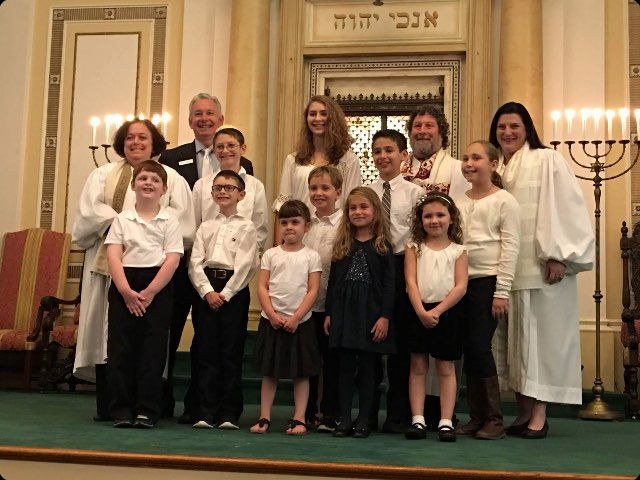urjnetworkadmin
Posts by :
Let’s be like Avraham and Sarah and change the world one person at a time.
The Rabbinical Council of America (RCA) is the umbrella professional organization of over 1,000 Orthodox Rabbis from North America and Israel. In my capacity as Vice President, I had the privilege of participating in a one day officers retreat this week to discuss the current state of Modern Orthodoxy and to strategize a vision for a bright and inspiring future.
The ambitious goal of articulating a broad, coherent and compelling vision for Orthodox Rabbis is fraught with difficult questions such as: How do we maintain a balance between the values of centralized authority and personal autonomy in halachik decision making, particularly for status issues that relate to the global Jewish community such as conversion policies and standards? How do we provide and promote a ‘big tent’ philosophy welcoming Rabbis who share different approaches and philosophies while at the same time maintain boundaries of acceptable halachik and hashkafic (ideological) ideas and behavior? How should the agenda of the Jewish community be set and how should we leverage our limited resources? How can we collaborate and create synergy with leadership of the greater Jewish community without compromising or diluting authentic and authoritative Torah positions and messages?
As we dialogued and debated questions like these and others, I couldn’t help but think about an important statistic that weighs heavily on me. In a world of billions of people, there are only 15 million Jews. Of them, only a small fraction are Orthodox and within Orthodoxy, only a small fraction define themselves as Modern Orthodox. Those who combine an unconditional and unwavering commitment to halacha and the supremacy of Torah and at the same time value general knowledge and culture, participation in the greater Jewish community and society at large, and lastly see religious significance in the modern State of Israel, are few in number and arguably inconsequential in the greater Jewish scene.
To me, the primary objective of the RCA and others must be to influence our own constituents to live inspired Jewish lives informed by Torah values and rich with Jewish meaning and purpose. Only then can we begin to have an impact on the greater scene and bring Torah’s vision for an ethical and uplifting society to the masses.
If this goal seems unachievable and out of reach, I encourage you to look no further than this week’s parsha and our great patriarch Avraham Avinu and his partner Sarah. They lived in a world saturated with paganism, corruption and selfishness and yet had the courage to articulate and spread the revolutionary message of ethical monotheism. They lived in a world with no mass media, email, social networking, youtube videos, microphones, billboards or newspapers and yet, look at the result of their efforts. Billions of people across the globe believe in one God and the Jewish values of justice, charity and ethical living. Avraham and Sarah likely never dreamt they would earn international fame and acclaim for their efforts. They simply believed they had a magnificent treasure and wanted to share it with others one at a time.
Let’s be like Avraham and Sarah and change the world one person at a time beginning with inspiring ourselves, our family members and those around us. Don’t forget to sign up for S.O.S. II taking place in just a couple of weeks and inspire yourself to inspire others.
You only get one opportunity to make a first impression.
After months of planning and design, this week we finally unveiled the new BRS website – www.brsonline.org We are very proud of its great features including a FAQ section for people who live here, those looking to move and those visiting. We have videos, podcasts, a blog, photo galleries, and much more. We have also included a member login where you can see your statements, pay your invoices, make donations and look someone up on the membership directory. We look forward to hearing your feedback and your help in spreading the word about this great new tool to reach people and spread the BRS mission. Look soon for the BRS app for apple and android. A tremendous thank you is due to Kerry Purcell in our office who put in countless hours, great creativity and hard work to make this new website a reality.
As we put the finishing touches on the new website this week, we kept reminding one another that it represents the face of the Shul to someone looking into who we are. You only get one opportunity to make a first impression and it is critically important to make a positive one if you want to get a relationship started on the right foot.
What is true for a website and a Shul, is true for how we present ourselves to others as well. Our faces are the homepage of who we are and how we are perceived. No matter what is happening in our hearts or our minds, we leave a strong impression on others based on the disposition carried in our faces. Do we project sadness, despair, worry, uncertainty and doubt? Or are we happy, positive, optimistic and joyful.
Rabbi Yisroel Salanter once said that our faces have the status of reshus ha’rabim, they are public domain and we therefore need to be sensitive to the public when we decide what mood we are going to project. The gemara (Kesubos 111b) says that it is better to smile at someone warmly than to provide him with food and drink. Rabbi Shlomo Wolbe writes that just as plants require sunshine to live, converting the rays of the sun into nutrients, people too convert smiles into energy and strength, and without it they wilt and perish. Smiling is a uniquely human expression. When is the last time you saw a dog or cat smile?
Dr. Nicholas Christakis, a physician at Harvard Medical School, authored a study that concludes that happiness is contagious. The same way when one person yawns, it affects others, when one person smiles or is happy it leads to others happiness and smiling as well.
This poem says it best:
It cost nothing, but creates much.
It enriches those who receive, without impoverishing those who give.
It happens in a flash and the memory of it lasts forever.
None are so rich they can get along without it and none so poor but are richer for its benefits.
It creates happiness in the home, fosters good will in a business, and is the countersign of friends.
It is rest to the weary, daylight to the discouraged, sunshine to the sad, and nature’s best antidote for trouble.
Yet it cannot be bought, begged, borrowed, or stolen, for it is something that is no earthly good to anybody till it is given away!
If someone is too tired to give you a smile, leave one of yours.
For, nobody needs a smile so much as those who have none to give.
We are a people only because of the book
Imagine the following scene playing out on CSPAN: On a specific day of the year, the Supreme Court justices together with the member of Congress take copies of the United States Constitution and dance around the floor of the House of Representatives while singing, clapping and lifting the law books high in the air. With each circuit of those carrying the Constitution, the others lean in to affectionately kiss the books before they pass by. This entire scenario seems impossible and the very suggestion of this scene is ludicrous.
And yet, this is exactly what we do on Simchas Torah in Shuls around the world. We collect all the Torahs from around the shul, sing and dance in a spirited fashion and kiss each Torah as it passes us by. What explains our seemingly bizarre behavior, especially in contrast with the attitude and approach every other legal system and religion brings to their law books?
Chief Rabbi Jonathan Sacks explains so beautifully:
“A Torah scroll is the nearest thing Judaism has to a holy object. Still written today as it was thousands of years ago — on parchment, using a quill, by a master-scribe — it is our most cherished possession. We stand in its presence as if it were a king. We dance with it as if it were a bride. We kiss it as if it were a friend. If, God forbid, one is damaged beyond repair, we mourn it as if it were a member of the family.
The Koran calls Jews a “people of the book,” but this is an understatement. We are a people only because of the book. It is our constitution as a holy nation under the sovereignty of God. It is God’s love letter to the children of Israel. We study it incessantly. We read it in the synagogue each week, completing it in a year. During the long centuries of Jewish exile, it was our ancestors’ memory of the past and hope for the future. It was, said the German poet Heinrich Heine, the “portable homeland” of the Jew. Some Christians have found it hard to understand the Jewish love of law. To them it sometimes seems like an obsession with detail, the “letter” rather than the “spirit.”
To us, though, it represents the idea that there is no facet of life that cannot be sanctified and turned into the service of God: eating, drinking, relationships, the workplace, the economy and our welfare system. God belongs to society as well as to the inwardness of the soul. Which is why we need law as well as love.”
We live in a world of great darkness in which people are desperately searching for meaning, purpose, happiness, joy, direction, fulfillment, family values, and more. While so much of the world struggles, we are amazingly blessed, fortunate and privileged to be charged by the ideals, values and laws of the Torah that truly provides a prescription for a meaningful life. It is not ours alone and we have no monopoly on its message. Etz chaim hi, lamachazikim bah, it is a tree of life for all those who hold on to it.
As we close in on seven long and intensive weeks that began with the first of Elul and ends with Simchas Torah, many of us feel burnt out, tired, and sick of cooking, eating, long davening and yes, even preparing and listening to sermons and classes. It is no coincidence that exactly when we begin to feel Jewish holidays and observant life are burdensome and difficult that we observe Simchas Torah and remember how fortunate and blessed we are to have Torah and the true simcha it brings.
As we head into the final stretch of this marathon season, I wish you a Chag sameach and a year filled with the simchas Torah, the joy of Torah and simchas ha’chayim, the joy of life.
Chag Sameach
I must admit, I am confounded and conflicted in my emotions.
Zman simchaseinu, Sukkos as a time of great joy, took on a whole new meaning this year with the announcement that Gilad Shalit will be released in the next few days. After 5 years languishing in a Hamas dungeon in an undisclosed location with absolutely no visits or contact from family, the people of Israel or even the Red Cross, Sergeant Shalit is finally coming home.
I must admit, I am confounded and conflicted in my emotions. On the one hand, I feel unbridled joy, jubilation and euphoria. As Prime Minister Netanyahu has said on a number of occasions, “Gilad Shalit is the son of every Israeli family,” and I would add of every Jewish family. Who could imagine the conditions he has faced, the treatment he has received, and the torture he has been forced to undergo by the brutal terrorists, Hamas. The mere thought of his release and return to his family and all of Israel elicits a feeling of boundless happiness.
And yet, on the other hand, I feel unbridled sadness and grief when contemplating the price that Israel must pay to secure Shalit’s return. The release of 1,000 terrorists who are sworn to the destruction of Israel and to the murder of innocent men, women and trouble is a source of sadness, anger, resentment and fear. Undoubtedly, there will be a hero’s welcome and a national celebration when Shalit is reunited with his family. But how will we all feel if God forbid just one of these vicious terrorists being released succeeds in striking Israel again, resulting in casualties?
On the one hand, Israel is showing incredible and remarkable commitment to her soldiers by displaying a willingness to go to extraordinary lengths to bring Gilad Shalit home. Morale in the IDF will surely be lifted by the knowledge that no matter what happens to them, their country will do everything in their power to protect their soldiers and secure their freedom.
However, on the other hand, how do the soldiers who risked their lives to capture these 1,000 terrorists feel, knowing that their efforts are being reversed when the prisoners they arrested will be back on the street and back to planning heinous attacks?
On the one hand, parents and family members of every Israeli soldier must be comforted to know how much the country values each and every soldier. On the other hand, how does the family of those murdered or injured by one of the 1,000 terrorists being released feel about this news?
Sukkos is a time of great simcha, joy, but it is specifically on this holiday that we read Kohelles which reminds us of our own vulnerability, fragility and the futility of many of our efforts. Even under the Chuppa, a moment of incredible happiness, we break a glass to remember the threats, challenges and problems we face.
As we celebrate Sukkos anticipating the return of our beloved soldier, Gilad Shalit, it seems to me to be appropriate to feel unbridled happiness and joy as well as unbridled sadness and sorrow at the same time, after all that seems to always be the Jewish way.
True greatness is not the ability to obey your thirst, it is the capacity to resist your thirst.
We are living in a time and culture that promote happiness, satisfaction and indulgence. Indeed, we are regularly inundated with messages and marketing such as “obey your thirst,” and “just do it.” In that context it is particularly difficult and onerous to observe a fast and to resist the temptation for food and water for a full 25 consecutive hours. And yet, the Torah associates Yom Kippur, the Holiest day of the year, a time in which we can achieve extraordinary heights in our spiritual ambitions, with self-restraint and self-control. True greatness is not the ability to obey your thirst, it is the capacity to resist your thirst and pursue a greater goal.
Judaism rejects embracing asceticism as a path to holiness. Yet, we collectively engage in abstinence from all types of physical pleasure for a full day to prove to ourselves and to God that we can. There is one temptation, one urge and desire that is not included in the abstinence of Yom Kippur, but which I would humbly submit we accept upon ourselves nevertheless. For some, this form of self-denial may be even more difficult than fasting from food and drink. I am referring to speech and the powerful and potent force it represents in this world.
There is nothing intrinsically wrong with food. Indeed, we need it to nourish ourselves and to sustain our existence. We are permitted and encouraged to indulge in tasty foods the other days of the year. However, on yom kippur, we achieve angelic status by elevating ourselves above the everyday mundane needs, wants and desires.
Similarly, not only is speech not inherently bad, it is good and serves as the bridge to allow us to communicate with others and Hashem. We should speak freely (but appropriately) throughout the year, but I would like to suggest that for Yom Kippur we accept upon ourselves to try to go a full day without speaking. In fact, some of our most pious men and women throughout Jewish history observed a ta’anis dibbur, a fast from speech, on yom kippur.
Not speaking to others for 25 hours sounds like an impossible goal and unachievable objective. Yet, doing so, I believe, would accomplish a number of goals. Firstly, we would eliminate the temptation to gossip, slander, or speak inappropriately on the holiest day of the year which most certainly would be a great merit. Secondly, by going into the day knowing that we will absolutely not talk for this period of time, we would be able to focus on our davening without feeling pressured to entertain conversation with the person sitting next to us. Lastly and most importantly, not talking to others would force us to spend time talking to ourselves, something we rarely do, but which is a necessary component of self-growth and development.
For many, accepting a ta’anis dibbur, a fast of speech for a full day is impossible. I understand that those with little children or elderly parents, etc. can’t simply check out for a full day. However, I would suggest that every single one of us is capable of observing a ta’anis dibbur while in Shul. Let’s collectively accept upon ourselves for 25 hours not to say a single word while in Shul, even during the parts of davening in which it is permitted to talk.
Throughout the year, when people approach me on the bima during davening, I struggle with my commitment not to talk on the one hand and the importance of not being rude on the other. Of course if there is an emergency or pressing issue, feel free to interrupt me or any of the Rabbis who can be of assistance. However, if you are just coming to say good Shabbos, please accept my apologies if I simply shake your hand and give you a big smile without engaging in a conversation.
Let’s all enter a social contract and commit to use the Sanctuary for davening exclusively and reserve our schmoozing for the lobby. I am confident that if we do, our personal and communal yom kippur experience will be greatly enhanced as a result.






 Ohef Sholom Facebook
Ohef Sholom Facebook Ohef Sholom Instagram
Ohef Sholom Instagram OST Religious School Facebook
OST Religious School Facebook Ohef Sholom Friends
Ohef Sholom Friends OSTY/JOSTY
OSTY/JOSTY